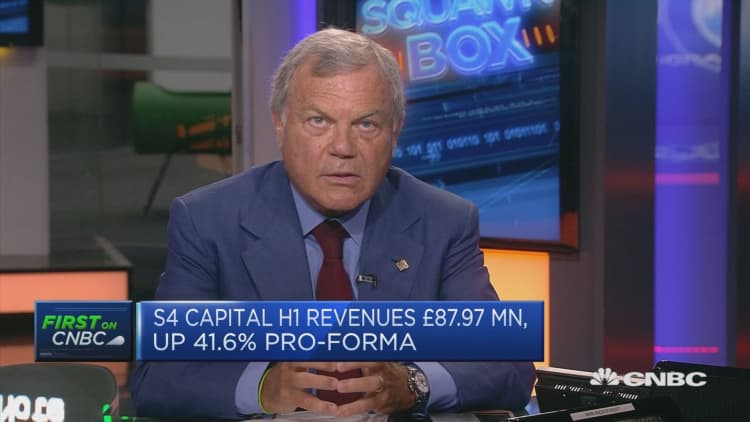Manufacturers don't have the direct relationships with shoppers they thought they would with the advent of the internet — it's platforms like Facebook that are in control, according to Martin Sorrell, executive chair of marketing group S4 Capital.
Traditionally, companies such as Unilever sell their products to stores such as Walmart, which then sell those goods on to consumers. With the advent of the internet, manufacturers imagined they would be able to move towards selling direct online, saving money and gathering information on shoppers in the process.
Speaking to CNBC's "Squawk Box" on Wednesday, Sorrell explained that taking over some of the retailers' role had not happened for ad agency clients.
"So, in the old days, the relationship with consumers was controlled by Walmart, Tesco, Carrefour," he said. Then, "the clients thought that when the web came along, they'd have the opportunity to relate directly to consumers. And the web gave them an opportunity — manufacturers — to go straight to you and I as a consumer."

But what happened instead, Sorrell said, is that platforms that he called "the big five" -- Google, Facebook, Amazon, Tencent and Alibaba -- "started to exercise great control."
In response, some manufacturers are investing in companies that do sell direct online. Sorrell cited Unilever's $1 billion acquisition of Dollar Shave Club in 2016 as an example of how manufacturers are trying to have more control over consumer relationships.
"But essentially, that direct-to-consumer relationship didn't mature. So what clients are concerned about, when Unilever buys a Dollar Shave Club, or when Coca-Cola buys a Costa, or when Nestle buys the Starbucks (coffee products) franchise … what they are really doing is trying to exercise control on that relationship and that's the key."
Large companies are at risk of losing out in the digital age, which has made it easier and cheaper for smaller businesses to operate and grow.
"Legacy companies … are in a very, very difficult position, the speed of the digital transformation … the scale of the change and the speed of the change is so great, that very few legacy companies can accommodate it and particularly in a listed situation," Sorrell said.
Sorrell applied this to agency groups, such as WPP, which he exited in April 2018. "I think it's very hard for the management of WPP to make the structural change necessary without ruffling (the media), or analysts starting to criticize very heavily the impact on the short-term profitability. Making the structural change in a short period of time is very difficult."
WPP announced the sale of research group Kantar to Bain Capital in July as part of its turnaround plan. Sorrell said S4 Capital was on track to double in size by 2021, as the group announced its earnings.

